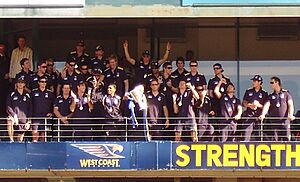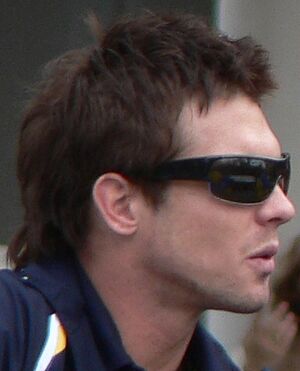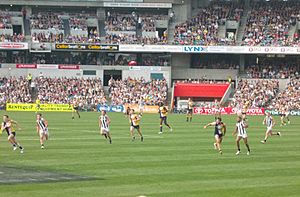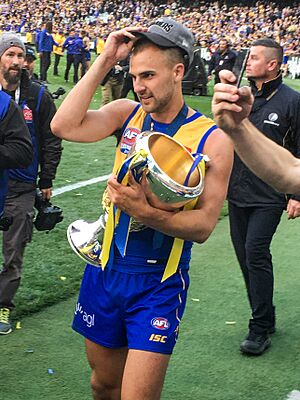History of the West Coast Eagles facts for kids
The West Coast Eagles is an exciting Australian rules football club from Perth, Western Australia. They play in the top league, the Australian Football League (AFL). The club started in 1986 and played its first game in 1987. After losing the 1991 Grand Final, the Eagles soared to win championships in 1992 and 1994. This made them one of the best teams in the 1990s!

They won their third championship in 2006. After a tough period, finishing last in 2010, they bounced back quickly in 2011 to finish fourth. In 2015, they reached another Grand Final but lost to Hawthorn. Then, in 2018, the West Coast Eagles defeated Collingwood to win their fourth championship! This made them the most successful team from outside Victoria in the modern era.
The 2020s have been a challenging time for the Eagles. From mid-2021 to the end of 2023, they won only 7 out of 55 games.
In 2023, the Eagles faced some very tough losses. They were beaten by huge margins, including a massive 171-point loss to the Sydney Swans. This was their biggest loss ever since joining the AFL in 1987. The team also had its longest losing streak, with 16 straight losses. But in Round 20, they broke that streak with an exciting 5-point win against the Kangaroos! They also had a surprising 7-point upset win against the Western Bulldogs. Club legends Shannon Hurn, Nic Naitanui, and Luke Shuey retired at the end of 2023.
The 2024 season started with more big losses. However, the Eagles showed great spirit against the Sydney Swans. They then had a shock 39-point win against Richmond. They also dominated their local rival, Fremantle, winning by 37 points. This was their first time winning two games in a row since 2021!
Contents
- How the Club Was Formed
- First Seasons: 1987–1989
- Malthouse Arrives and First Grand Final: 1990–1991
- Winning Championships: 1992–1994
- New Rivalry: 1995–1996
- Finals Challenges: 1997–1999
- Tough Times: 2000–2001
- John Worsfold's Return: 2002–2004
- Rivalry with Sydney: 2005
- Third Championship: 2006
- End of an Era: 2007
- Missing the Finals: 2008–2010
- Breakthrough Season: 2011
- Last Years with Worsfold: 2012–2013
- Adam Simpson Era and Fourth Championship: 2014-Present
How the Club Was Formed
In the 1980s, both the VFL (Victorian Football League) and WAFL (West Australian Football League) were struggling. They realized that a national league was needed to survive. In 1986, the VFL decided to allow teams from Perth and Brisbane to join. Western Australia was a strong area for Australian rules football. Many star players from WA moved to Victorian clubs, which made local interest in the WAFL decline.
A company called Indian Pacific, led by Richard Colless, started looking into the idea of a Western Australian VFL team. Public support grew after Western Australia won the 1986 Australian Football Championships. This showed they were stronger than Victoria in the sport that year.
In August 1986, Indian Pacific Limited officially applied for the Western Australian license. The VFL agreed to a $400,000 annual fee for 10 years. However, some Victorian clubs worried about losing their star players or the cost of travel to Perth. So, the VFL changed the deal. They said the Perth team would have to pay $4 million upfront. The VFL believed that more TV money from a new audience would cover the travel costs.
The Western Australian license was officially given on October 1, 1986. Even before the club was fully formed, they started signing contracts with West Australian players who were playing in the VFL. On October 20, 1986, the "West Coast Eagles Football Club" was officially created.
The new club had only 160 days to build a team and get everything ready for their first season in 1987. They hired Ron Alexander as their first coach on September 22, 1986. By October 30, they had their first 32-player squad.
First Seasons: 1987–1989
| First VFL Match | Goals | Behinds | Total |
| West Coast | 20 | 13 | 133 |
| Richmond | 16 | 23 | 119 |
| Venue: Subiaco | Crowd: 23,897 | ||
The Eagles played their first official game at Subiaco Oval against Richmond on March 29, 1987. A crowd of 23,897 watched. The Eagles were losing by 33 points in the last quarter. But they made an amazing comeback, scoring nine goals to Richmond's one! They won by 14 points. This was a club record for a final quarter comeback. By the end of the season, the Eagles had won eleven games and lost eleven. This was a good effort for a new team. However, their first coach, Ron Alexander, was replaced by John Todd.
In 1988, the Eagles got even better. They finished fourth in the regular season. They narrowly lost their first final to Melbourne by just two points. Everyone at the club was excited about the future.
However, the 1989 season was very tough. Many players were injured or out of form. The club won only two games in the first fifteen rounds. They suffered a huge 142-point loss to Essendon. There was even talk of closing the club because of financial problems. But the Eagles fought back, winning five of their last seven games. This saved the club, but John Todd was replaced as coach.
Malthouse Arrives and First Grand Final: 1990–1991
| 1991 Grand Final | Goals | Behinds | Total |
| Hawthorn | 20 | 19 | 139 |
| West Coast | 13 | 8 | 86 |
| Venue: Waverley Park | Crowd: 75,320 | ||
| 1991 Home & Away Season | Wins | Losses | Draws | Total Points | Percentage | ||||
| West Coast | 19 | 3 | 0 | 76 | 162.21 | ||||
| Minor Premiers | |||||||||
As the VFL became the new AFL, the Eagles started the 1990s with a new coach, Mick Malthouse. He came from Footscray. They also had a new captain, Steve Malaxos. These changes, and new young players, led to a strong comeback. The club won sixteen games and finished third in 1990. They drew a thrilling final against Collingwood. Even though they lost the replay, they made it to the Preliminary Final.
In 1991, young player John Worsfold became captain. The team had an amazing season, winning their first 12 games and 19 games overall! This was a club record that still stands. They finished first on the ladder, the first time a non-Victorian team had done this. However, the young team struggled with the pressure in the finals. They reached the 1991 AFL Grand Final but lost to Hawthorn by 53 points. This Grand Final was played at Waverley Park and was the first to feature a non-Victorian team.
Winning Championships: 1992–1994
| 1992 Grand Final | Goals | Behinds | Total |
| West Coast | 16 | 17 | 113 |
| Geelong | 12 | 13 | 85 |
| Venue: MCG | Crowd: 95,007 | ||
The Eagles were not as dominant in 1992 but still made the finals. They won a classic final against Hawthorn. This led them to the Grand Final against Geelong at the MCG. The Eagles started slowly, falling behind by four goals. But they came back strongly to win by 28 points! This was the club's first ever championship. Peter Matera won the Norm Smith Medal for being the best player on the field. This was also the first AFL championship won by a team from outside Victoria.
| 1994 Grand Final | Goals | Behinds | Total |
| West Coast | 20 | 23 | 143 |
| Geelong | 8 | 15 | 63 |
| Venue: MCG | Crowd: 93,860 | ||
| 1994 Home & Away Season | Wins | Losses | Draws | Total Points | Percentage | ||||
| West Coast | 16 | 6 | 0 | 64 | 132.19 | ||||
| Minor Premiers | |||||||||
In 1994, the Eagles again finished first on the ladder, winning their second McClelland Trophy. They carried this great form into the finals. They had a close call against Collingwood but didn't lose any games in the finals series. They ended up crushing Geelong by 80 points in the Grand Final! This secured their second championship. Dean Kemp won the Norm Smith Medal for his outstanding performance.
New Rivalry: 1995–1996
In 1995, a new local AFL club, the Fremantle Football Club, joined the league. This created a fierce rivalry known as the Western Derby. The two Perth teams would play each other twice a year. For most of the 1990s, the Eagles dominated the derby, winning the first nine games.
| First Western Derby | Goals | Behinds | Total |
| West Coast | 23 | 13 | 151 |
| Fremantle | 9 | 12 | 66 |
| Venue: Subiaco | Crowd: 40,356 | ||
The Eagles' performance on the field wasn't quite as strong as their championship years, but they still made the finals. In 1996, young Eagle Ben Cousins won the club's first AFL Rising Star award. This award goes to the best rookie (new player) in the competition.
Finals Challenges: 1997–1999
In 1997 and 1998, the Eagles made the finals but were knocked out early. In 1999, the Eagles again earned a home final but had to play it at the MCG due to a league contract. They lost to Carlton. This rule was later changed.
The 1999 season is also remembered for rumors that coach Mick Malthouse would move to Collingwood. These rumors turned out to be true. Malthouse left, and Ken Judge became the new coach for 2000. Also in 1999, Scott Cummings became the first Eagle to win the Coleman Medal for kicking the most goals in the AFL, with 95 goals.
Tough Times: 2000–2001
Ken Judge's time as coach started well in 2000. The Eagles thrashed the reigning champions, North Melbourne. They also won two games by over 100 points. But injuries hit the team hard, and they only won one more game for the rest of the season. They missed the finals for the first time since 1989. Dean Kemp and Ben Cousins became co-captains. The Eagles also introduced new, less popular uniforms during these years, which they later changed back.
The 2001 season was even worse. Plagued by injuries and older players struggling, the club finished 14th. They won only five games all year, all against other teams at the bottom of the ladder. Ken Judge was sacked after the season. Former premiership captain John Worsfold took over as coach.
John Worsfold's Return: 2002–2004
Worsfold faced a huge challenge in his first coaching role. Many thought the team would sink even lower. But Worsfold and his young team surprised everyone. They were almost unbeatable at home and won some key away games. They made an unexpected finals appearance in 2002, winning eleven games and losing eleven. They lost their first final but it showed great improvement. The 2002 season also saw the debut of future star Chris Judd.
The 2003 and 2004 seasons were different. In 2003, the Eagles started strong but injuries in the second half of the season caused them to drop down the ladder. They just made the finals but were knocked out quickly. In 2004, the season looked bad early on. But a dramatic comeback late in the season saw the Eagles snatch a finals spot. They were then heavily beaten by the Sydney Swans in a thunderstorm.
However, 2004 was special because Chris Judd became the first Eagle to win Australian Football's highest individual award, the Brownlow Medal. This award goes to the best and fairest player in the league.
Rivalry with Sydney: 2005
| 2005 Grand Final | Goals | Behinds | Total |
| Sydney | 8 | 10 | 58 |
| West Coast | 7 | 12 | 54 |
| Venue: MCG | Crowd: 91,828 | ||
In 2005, the Eagles started by winning their first eight games! They then lost to Collingwood. The Eagles were five games clear at one point but had a poor finish to the season. They lost the minor premiership to the Adelaide Crows. But the Eagles turned it around in the finals and made it to the Grand Final against the Sydney Swans. The Swans held on to win a low-scoring game by just four points. It was a tough loss for the Eagles. However, Chris Judd won the Norm Smith Medal for best on ground, even though his team lost. This, along with captain Ben Cousins winning the Brownlow Medal, showed how strong the Eagles' midfield was.
Third Championship: 2006
| 2006 Home & Away Season | Wins | Losses | Draws | Total Points | Percentage | ||||
| West Coast | 17 | 5 | 0 | 64 | 120.44 | ||||
| Minor Premiers | |||||||||
The 2006 season started with some challenges for the Eagles. Despite this, they began in good form, winning eleven of their first twelve games. This included an amazing comeback against Geelong, where they were 54 points down in the third quarter! The Eagles then had a few tough weeks. But strong play late in the season helped them win the minor premiership, their third McClelland Trophy.
| 2006 Grand Final | Goals | Behinds | Total |
| West Coast | 12 | 13 | 85 |
| Sydney | 12 | 12 | 84 |
| Venue: MCG | Crowd: 97,431 | ||
In the 2006 finals, the Eagles were favorites. They lost their first game to Sydney by just 1 point. But they bounced back strongly, thrashing the Bulldogs. They then came from behind to beat the Crows. This set up another Grand Final clash with the Swans. The Grand Final was incredibly close. The Eagles won by a single point! It was one of the greatest Grand Finals in recent years. Andrew Embley won the Norm Smith Medal for his best-on-ground performance.
End of an Era: 2007
The Eagles' 2007 pre-season was very challenging. Ben Cousins was suspended from the club. Despite this, the Eagles started the season well, winning their first 6 matches. This included another one-point victory over the Sydney Swans. However, the 2007 Eagles were not as dominant as in 2005 or 2006. They finished third on the ladder.
The Eagles' finals series was hurt by injuries to key players. Ben Cousins also got a hamstring injury. West Coast lost both their finals games. They lost to Port Adelaide by three points and then to Collingwood by 19 points in an exciting game that went into extra time.
After the season, premiership captain Chris Judd announced he wanted to move back to Melbourne. This was a big loss for the club.
Missing the Finals: 2008–2010
These years saw the Eagles miss the finals three years in a row for the first time. At the end of the 2009 season, they won 4 of their last 5 matches. This included beating strong team Western Bulldogs. In 2010, the Eagles had a very tough season. They finished last on the ladder, earning the wooden spoon for the first time in club history. They won only four games all season.
| 2010 Home & Away Season | Wins | Losses | Draws | Total Points | Percentage | ||||
| West Coast | 4 | 18 | 0 | 16 | 77.09 | ||||
| Wooden Spooners | |||||||||
Many believed the Eagles' struggles were partly due to the club making big changes to improve its culture. The chairman, Andrew Barnaba, said he wanted a "very strong club" more than just a winner. After the tough 2010 season, there were questions about coach John Worsfold's future.
Breakthrough Season: 2011
The 2011 season started well for the West Coast Eagles. They won their first two games, including a narrow win over North Melbourne. Their undefeated start ended with a loss to the Sydney Swans. This was their only home loss for the season.
They continued to play well, beating Melbourne by 9 goals. In the Round 8 derby, the Eagles easily beat their rivals Fremantle by 33 points. Matt Priddis won the Ross Glendinning Medal for best-on-ground. In Round 9, the Eagles had a huge 123-point win against the Western Bulldogs. Josh Kennedy kicked 10 goals and Luke Shuey kicked 5 goals in that game!
In Round 14, the Eagles comfortably beat Carlton. This was their first win against Carlton since Chris Judd left the Eagles.
Round 16 saw the Eagles defeat the top team, Geelong, in a thrilling 96–88 match. This was a big win and helped the team push into the top 4. At the end of the season, the West Coast Eagles finished 4th on the ladder. This gave them a valuable "double chance" in the finals.
West Coast entered their first finals campaign in four years. They lost their first final to the defending champions Collingwood. But because they finished fourth, they got a home final against Carlton. They won a very close game by less than one goal! The Eagles' improved season ended with a convincing loss to the eventual champions Geelong.
The Eagles' jump from 16th to fourth place was one of the biggest improvements in a single season. They became the first team since the Brisbane Lions in 1998–1999 to reach a preliminary final just one year after finishing last.
Last Years with Worsfold: 2012–2013
| 2012 NAB Cup Grand Final | Super Goals | Goals | Behinds | Total |
| Adelaide | 2 | 10 | 17 | 95 |
| West Coast | 2 | 5 | 13 | 61 |
| Venue: AAMI Stadium | Crowd: 27,376 | |||
West Coast started 2012 strongly. They lost the 2012 NAB Cup grand final to Adelaide. They then won their first six regular season games. However, their form dropped towards the end of the season, and they finished fifth. The Eagles thrashed North Melbourne by 96 points in their first final. But they lost to Collingwood by 13 points in the semi-finals. In 2013, the Eagles were expected to be strong, but injuries and poor form led them to finish thirteenth. Coach John Worsfold resigned on September 5, 2013.
Adam Simpson Era and Fourth Championship: 2014-Present
On October 4, 2013, former North Melbourne player Adam Simpson was announced as the Eagles' new coach. Darren Glass was captain for 2014 but retired mid-season. Five players shared the captaincy for the rest of the year: Shannon Hurn, Josh Kennedy, Eric Mackenzie, Matt Priddis, and Scott Selwood. West Coast had a strong pre-season and won their first three games in 2014. They finished ninth that year. Midfielder Matt Priddis became the third Eagles player to win a Brownlow Medal in 2014. Shannon Hurn was named the sole captain for 2015.
| 2015 Grand Final | Goals | Behinds | Total |
| Hawthorn | 16 | 11 | 107 |
| West Coast | 8 | 13 | 61 |
| Venue: MCG | Crowd: 98,633 | ||
In 2015, the Eagles had a tough pre-season with a key injury to defender Eric Mackenzie. They started the season with two losses. Many thought it would be a bad year. But a surprise win over Port Adelaide started a 6-game winning streak! They later had another 6-game winning streak. The Eagles finished second on the ladder, behind their local rivals Fremantle. West Coast had a record average winning margin of 66 points at their home ground, Subiaco. The Eagles defeated Hawthorn and North Melbourne in the finals to reach the 2015 Grand Final. This was their first Grand Final since 2006. However, they lost to Hawthorn by 46 points.
The 2016 season was a disappointment. The team failed to finish in the top 4. In their first final, the Eagles were heavily favored but lost at home to the Western Bulldogs. The Bulldogs went on to win the 2016 championship.
The Eagles struggled with consistency in 2017. After a strong start, they had a three-match losing streak. They barely made the finals, finishing eighth by a tiny margin. The Eagles defeated Port Adelaide by two points in an amazing extra-time final. Luke Shuey kicked the winning goal after the siren! However, their season ended the next week with a big loss to Greater Western Sydney.
| 2018 Grand Final | Goals | Behinds | Total |
| West Coast | 11 | 13 | 79 |
| Collingwood | 11 | 8 | 74 |
| Venue: MCG | Crowd: 100,022 | ||
Few expected West Coast to do well in 2018. But after losing their first game at the new Optus Stadium, they won 10 games in a row! They surged to the top of the ladder. Injuries to star forwards Josh Kennedy and Jack Darling caused some struggles. All-Australian ruckman Nick Naitanui also suffered a serious knee injury. Star midfielder Andrew Gaff was suspended for 8 weeks. Many thought the Eagles couldn't win the flag after these setbacks. But in Round 22, Jeremy McGovern kicked a goal after the siren to win a game against Port Adelaide!
The Eagles finished second on the ladder with 16 wins and 6 losses, their best result since 2006. They faced Collingwood in the first final and won by 16 points. In the preliminary final, the Eagles played the strong Melbourne Demons. What was expected to be a close game turned into a huge win for the Eagles. They kept Melbourne goalless in the first half! The Eagles cruised to a 66-point victory. Collingwood then shocked Richmond in the other preliminary final, setting up a Grand Final between West Coast and Collingwood.
The 2018 Grand Final was played in front of 100,022 people at the MCG. It was incredibly close! Collingwood led for almost the entire game, including by 29 points in the first quarter. But the determined Eagles fought their way back. With just over 2 minutes left, a brilliant play led to Dom Sheed kicking a goal from a difficult angle. This put the Eagles 4 points in front! The Eagles held on to win 79 to 74, claiming their fourth championship. Luke Shuey won the Norm Smith Medal.
Despite a mixed start to the 2019 season, the Eagles became one of the top teams again. They lost only twice between Round 7 and Round 21. However, they lost their last two games and finished fifth. They won their first final against Essendon by 55 points. But their season ended in the second week, losing to Geelong by 20 points.
The 2020 AFL season was affected by the COVID-19 pandemic. The season was paused and teams had to move to special hubs. The Eagles struggled early, losing three games in a row. But when they returned to Perth, they thrived, winning eight games in a row! They finished fifth on the ladder. The Eagles were expected to beat Collingwood in their first final, but they suffered a stunning one-point defeat.
The 2021 season was difficult for West Coast. After a good start, they won only two of their last nine matches. The Eagles missed the finals, finishing ninth.
The 2022 season was one of the Eagles' worst, with many injuries. They finished second last with only two wins.
In Round 15, 2023, the Eagles had their worst ever defeat, losing to Sydney by 171 points. This was the fourth largest losing margin in AFL/VFL history. Sydney scored over 200 points, winning 31.19 (205) to 5.4 (34).
 | James B. Knighten |
 | Azellia White |
 | Willa Brown |





